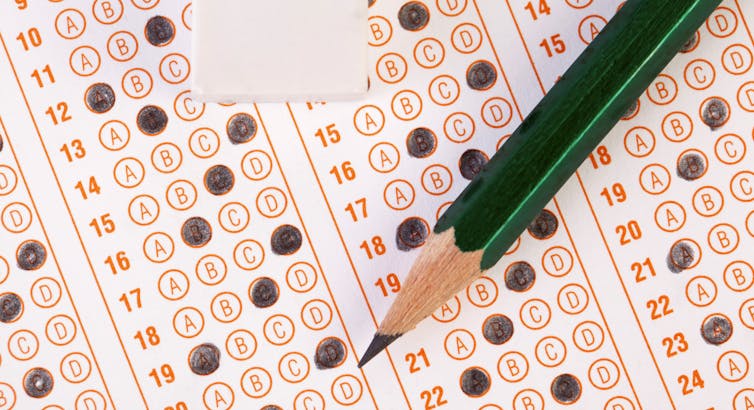Skipping standardized tests in 2020 may offer a chance to find better alternatives
- Written by James D. Kirylo, Professor of Education, University of South Carolina
The Education Department[1] is letting states cancel standardized tests. The move is a practical one: School buildings across the nation are closed[2] due to the coronavirus pandemic, even though distance learning efforts are widespread.
As a result, 2020 is the first year without federally mandated standardized testing in nearly two decades. Washington has required all states to use these tests to evaluate students, teachers, principals, schools and entire school systems, first in accordance with accountability measures shaped by the 2002 No Child Left Behind Act[3] and later under the 2015 Every Student Succeeds Act[4].
Until now, students in third through eighth grade[5] were taking standardized tests annually for language arts and math, and then at least once again in high school. In addition, they took at least one science standardized test in elementary, middle and high school. All told, not counting practice sessions and drills, students spend between 20-25 hours a year[6] taking standardized tests. By the time many Americans graduate from high school they’ve taken approximately 112 of them.
As an educational researcher[7] who explores the concept of assessment in my book “Teaching with Purpose: An Inquiry into the Who, Why, and How We Teach[8]” and the father of two school-aged children, I do believe students should be assessed on a regular basis. But I wonder whether they are taking too many standardized tests and if there are better ways to evaluate whether students are on track.
 Between kindergarten and high school, students take more than 100 standardized tests.
gece33/Getty Images[9]
Between kindergarten and high school, students take more than 100 standardized tests.
gece33/Getty Images[9]
Evaluating teachers
States get to decide how their public schools use standardized test scores when they evaluate teachers[10]. For example, scores in New Mexico count as 35% toward evaluation, while Florida school districts choose how much weight they give test scores for this purpose. Some states, including Alaska, Arkansas, Kansas, Kentucky, North Carolina and Oklahoma no longer include scores in their system of teacher evaluation.
There are states, including Colorado, Georgia, Louisiana and Mississippi, that have suspended or waived their teacher evaluations[11] altogether for the 2019-2020 school year. Others, such as Delaware, New Jersey and Pennsylvania have waived some of their requirements. And still others, such as Ohio, Texas and Virginia have granted school systems flexibility and discretion.
Guiding instruction
Teachers may use test data[12] to guide instruction. For example, if a student gets a low score on a portion of a standardized test, the teacher might focus on that area of weakness to better meet the needs of that student through individualized or small group instruction. However, this practice isn’t always helpful because as many as four months can elapse[13] between when students take tests and teachers get to see their scores.
Telling parents about their child’s progress
At least in theory, standardized test scores are supposed to let parents and other guardians know if their children are on track. In practice, that’s not always the case. It’s usually quite challenging[14] for anyone unfamiliar with educational terms and metrics to decipher what the results indicate.
Alternatives
Standardized testing is a fraught issue. Many educators and parents are concerned that there are too many of them and that the scores are misused[15]. Other widespread concerns are that schools are narrowing the curriculum by overemphasizing subjects like math and reading[16] and that high-stakes testing is making children suffer high levels of anxiety[17].
Many teachers and educational researchers question whether test scores say anything about teacher performance[18] and whether the costs of administering them[19] are justified.
Nevertheless, school systems can’t function without assessing their students and teachers. They will need to figure out how to proceed without standardized tests.
Moving forward, in my view, school systems and other authorities can take advantage of this remarkable time to seek alternatives[20] to standardized tests. One good option is a portfolio-based assessment system that includes a diverse range of student work, along with systematically giving students immediate feedback[21] on their work.
For a broader sense of whether all students are learning, I think that the National Assessment of Educational Progress[22], also known as the Nation’s Report Card, is very valuable in providing data on how students are progressing in reading and math. Large representative samples of fourth and eighth graders who attend public and private schools take this standardized test every other year.
[You’re smart and curious about the world. So are The Conversation’s authors and editors. You can read us daily by subscribing to our newsletter[23].]
References
- ^ Education Department (www.ed.gov)
- ^ School buildings across the nation are closed (www.usatoday.com)
- ^ No Child Left Behind Act (www.pbs.org)
- ^ Every Student Succeeds Act (www.ed.gov)
- ^ third through eighth grade (www.understood.org)
- ^ spend between 20-25 hours a year (eric.ed.gov)
- ^ educational researcher (scholar.google.com)
- ^ Teaching with Purpose: An Inquiry into the Who, Why, and How We Teach (rowman.com)
- ^ gece33/Getty Images (www.gettyimages.com)
- ^ evaluate teachers (www.edweek.org)
- ^ suspended or waived their teacher evaluations (www.ecs.org)
- ^ test data (www.ericdigests.org)
- ^ as many as four months can elapse (inservice.ascd.org)
- ^ usually quite challenging (theconversation.com)
- ^ too many of them and that the scores are misused (theconversation.com)
- ^ overemphasizing subjects like math and reading (www.ascd.org)
- ^ making children suffer high levels of anxiety (theconversation.com)
- ^ whether test scores say anything about teacher performance (www.epi.org)
- ^ costs of administering them (www.edweek.org)
- ^ seek alternatives (www.npr.org)
- ^ immediate feedback (ncte.org)
- ^ National Assessment of Educational Progress (www.nationsreportcard.gov)
- ^ You can read us daily by subscribing to our newsletter (theconversation.com)
Authors: James D. Kirylo, Professor of Education, University of South Carolina

